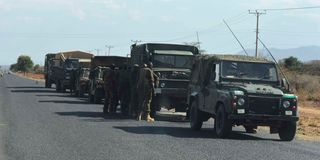Premium
Locals pick up pieces as banditry war continues

A Kenya Defense Forces (KDF) convoy with artery launchers on the Emining-Marigat Road in Baringo County on March 13, 2023 after Interior Cabinet Secretary Prof. Kithure Kindiki announced the start of the second phase of operation to wipe out bandits.
Faced with hunger, victims of banditry in Kerio Valley are slowly returning to their abandoned farms despite sporadic attacks.
At the height of the banditry menace in the North Rift that has left hundreds of people dead and thousands displaced from their villages, residents were forced to flee from their homes. They abandoned their farming activities, which was their economic mainstay.
Many months, and in some cases years, down the line, many — faced with hunger — are hoping the ongoing operation will bear fruit and allow them to go back to their farms.
At the Sh300 million African Development Bank (ADB)-funded Kabonon/Kapkamak irrigation scheme, locals have ploughed a paltry 100 acres out of the 2, 000-acre farm.
“We go to the farm very early in the morning or evening because the bandits are lurking in the nearby bushes. Whenever they spot a farmer tilling the land, they spray bullets at them,” said Ms Edna Kanda, who has scaled down her two-acre sorghum farm to a quarter.
“I was planting sorghum under contract farming which has since collapsed. We no longer have sufficient food and lack a source of income due to banditry and at the moment we cultivate small pieces of land,” she said.
Irrigation scheme
The irrigation scheme benefited 3,000 people directly who cultivated maize, sorghum, millet, green grams, watermelons, vegetables and other crops, making the region food secure.
Another farmer, Mr Benjamin Kibet, said they are currently tilling the land with extra caution.
“The farm is unevenly cultivated because of the risks involved. Those who neighbour the Kerio River where the bandits rule completely abandoned their plots and those on the upper side are the only ones ploughing about 100 acres,” he said.
Mr Willy Kosgey, another farmer, said the scheme ensured food security and was a source of income for the residents through the sale of surplus yields.
“No substantive farming has taken place in Kerio Valley for several years now. People abandoned the farms because they were turned into battlefields. Several people have been killed,” Mr Kosgey said.
“Some of the farmers are trying to farm and I think the government should provide security around the schemes to allow locals to farm. A food crisis has hit the region because of the abandoned farms,” he said.
Elgeyo Marakwet Agriculture executive Edwin Seroney said farmers lost at least Sh500 million in the past three months.
“January through March is usually the time for harvesting but the farmers harvested nothing since no one was farming. Most of the land is covered with bushes after the residents fled,” he said.





